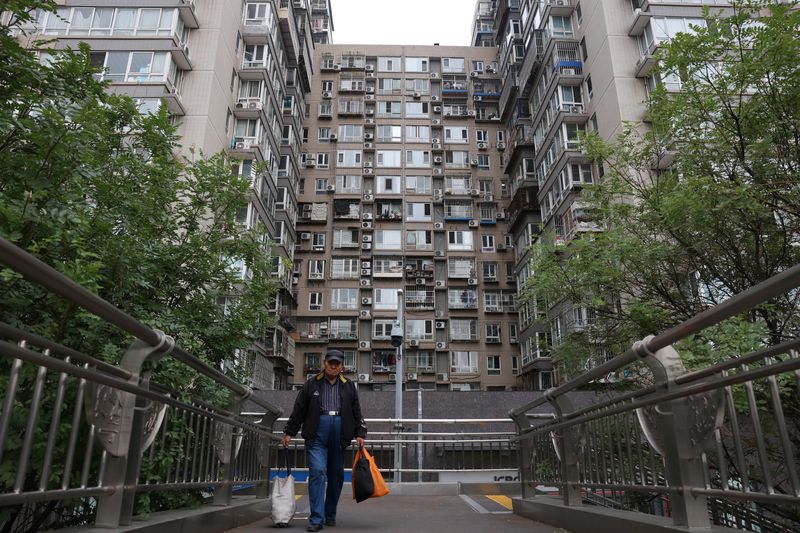By Kevin Yao and Ziyi Tang
BEIJING (Reuters) – China’s planned fiscal package targets damaged property and local government balance sheets that weigh on the economy and fuel deflationary pressures, thus acting as a stabiliser rather than the instant growth booster markets craved.
Larger-than-expected monetary stimulus last month fuelled unfettered investor speculation about a complementing, blockbuster fiscal programme to immediately revive sagging economic activity.
On Tuesday, Reuters reported that China is considering approving next week new debt issuance of more than 10 trillion yuan ($1.4 trillion) in coming years.
Some 6 trillion yuan will go chiefly towards lowering the off-books debt of municipalities, while 4 trillion will fund buybacks of idle land from cash-strapped developers and help reduce a giant inventory of unsold flats.
The measures in the works represent a more calibrated approach to stimulus, which is a departure from previous all-out strategies to revive growth.
In 2008, for example, China threw lavish resources directly at the infrastructure and property sectors to counter the effects of the global financial crisis.
“The primary goal of this stimulus is clearly more about shoring up balance sheets rather than boosting near-term GDP growth,” said Christopher Beddor, deputy China research director at Gavekal Dragonomics.
“It should ease the strains, but not necessarily generate instantly higher spending.”
This prudent approach is partly informed by the fact that China is now suffering from the excesses of previous stimulus. But it also leaves open questions about the impact the measures will have on short- and long-term growth.
That lingering uncertainty is reflected in financial markets, with Chinese stocks down about 0.5% on Wednesday, pulling other Asian markets lower.
“The package can be a painkiller, rather than a booster for the economy,” said Gary Ng, senior economist at Natixis. “The economic impact may not be as big as it looks on the surface.”
CLOGGED PIPES
Still, a programme worth more than 8% of the world’s second-largest economy’s gross domestic product (GDP) cannot be dismissed.
“It’s not just about quantity. It’s about providing a sense of stability,” said Zong Liang, chief researcher at state-owned Bank of China.
Local governments, facing high debt and falling revenues, have been cutting civil servants’ pay and other expenses. Property developers starved for cash have struggled to resume work on incomplete projects, hitting jobs and incomes.
China hopes to unclog the pipes that transmit money to businesses and consumers by shifting liabilities onto the central government’s healthier balance sheet, which only carries a debt load of 24% of GDP.
“Policymakers seem to sense that there’s a major liquidity squeeze right now unfolding among local governments, in large part due to the property downturn, leading many local authorities to stop paying their staff and corporate suppliers,” Gavekal’s Beddor said.
Tackling that squeeze releases resources into the real economy, but the impact may only show up in the second half of 2025, he added.
Another lingering question is whether the package merely postpones the debt crunch.
The International Monetary Fund calculates explicit local government debt at 31% of GDP at the end of 2023, that of their finance vehicles at a further 48% of GDP, and other government-related debt at another 13%.
Add the central government’s debt and the total reaches 116 trillion yuan, the Fund estimates.
In the property sector, Goldman Sachs estimates the unsold real estate inventory, if fully built, would amount to 93 trillion yuan.
Overcoming these past excesses hinges on whether the package can kick off a virtuous growth circle that allows China to curb, rather than simply transfer these liabilities.
Many analysts say a decades-old household consumption deficit holds back such prospects.
Low wages, high youth unemployment and a feeble social safety net leave China’s household spending below 40% of GDP, or about 20 percentage points behind the global average.
While Beijing is also expected to unveil consumer subsidies for appliances and other goods, the amount will be a tiny fraction of the gap.
“It seems support for consumption remains modest,” said Louis Kuijs, chief Asia economist at S&P Global.
“That means it remains unlikely that we will see a substantial improvement of the economic growth outlook or that deflation risks have been vanquished.”

